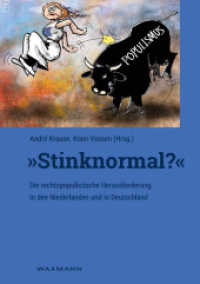Full Description
This book presents the proceedings of the fourth U.S.-Russian interacademy workshop on the general theme of countering terrorism, which was held in Moscow in March 2007. The fourth in a series, this volume continues to explore topics related to urban terrorism, but with a new emphasis on potential attacks involving biological agents, transportation networks, and energy systems.
The other books in the series include:
High Impact Terrorism: Proceedings of a Russian-American Workshop (2002)
Terrorism: Reducing Vulnerabilities and Improving Responses: U.S.-Russian Workshop Proceedings (2004)
Countering Urban Terrorism in Russia and the United States: Proceedings of a Workshop (2006)
Table of Contents
Front Matter
Summaries, 1 U.S.-Russian Working Group on Bioterrorism--Claire Cornelius (Rapporteur)
2 U.S.-Russian Working Group on Transportation System Vulnerabilities--Cynthia Getner (Rapporteur)
3 U.S.-Russian Working Group on Energy System Vulnerabilities--A. Chelsea Sharber (Rapporteur)
Selected Papers, 4 Tendencies in Global Terrorism--Raphael Perl
5 Use of Predictive Modeling Packages for Effective Emergency Management--Nikolai Petrovich Kopylov and Irek Ravilevich Khasanov
6 Organizational Measures and Decision Support Systems for Preventing and Responding to Terrorist Acts at Potentially Hazardous Facilities, on Transportation Systems, and in Locations Where Large Numbers of People Congregate--A. Yu. Kudrin, A. I. Zaporozhets, and S. A. Kachanov
7 Characteristics of Technological Terrorism Scenarios and Impact Factors--Nikolai A. Makhutov, Vitaly P. Petrov, and Dmitry O. Reznikov
8 Activities of the Russian Federal Medical-Biological Agency Related to Radiation, Chemical, and Biological Security--Vladimir V. Romanov
9 Disease Surveillance and International Biosecurity--David R. Franz
10 Emerging Viral Infections in the Asian Part of Russia--Sergei V. Netesov and Natalya A. Markovich
11 A Note on the Interfacial Vulnerabilities of Transportation Systems--George Bugliarello
12 Transportation Planning for Evacuations--John C. Falcocchio
13 International and National Priorities in Combating Terrorism in the Transportation Sector--Vladimir N. Lopatin
14 Managing the Radius of Risk--Drew F. Lieb
15 The Problem of Oil and Natural Gas Pipeline Security--S. G. Serebryakov
16 U.S.-Russian Collaboration in Combating Radiological Terrorism--John F. Ahearne
17 IAEA Activities in Preventing Radiological and Nuclear Terrorism--Miroslav Gregoric
18 Electromagnetic Terrorism: Threat to the Security of the State Infrastructure--Vladimir Ye. Fortov and Yury V. Parfyonov
19 The Phenomenon of Suicide Bombings in Israel: Lessons Learned--Mordecai Z. Dzikansky
20 Raman Spectroscopic Detection of Chemical, Biological, and Explosive Agents--Russ Zajtchuk and Gary R. Gilbert
21 The U.S. Department of Homeland Security Science and Technology Directorate--John O'Neil
Appendix A: Agenda
Appendix B: Recent Russian and International Publications of Interest
Appendix C: Russia's Counterterrorism Strategy--Valentin A. Sobolev
Contents
1 Front Matter; 2 Summaries, 1 U.S.-Russian Working Group on Bioterrorism--Claire Cornelius (Rapporteur); 3 2 U.S.-Russian Working Group on Transportation System Vulnerabilities--Cynthia Getner (Rapporteur); 4 3 U.S.-Russian Working Group on Energy System Vulnerabilities--A. Chelsea Sharber (Rapporteur); 5 Selected Papers, 4 Tendencies in Global Terrorism--Raphael Perl; 6 5 Use of Predictive Modeling Packages for Effective Emergency Management--Nikolai Petrovich Kopylov and Irek Ravilevich Khasanov; 7 6 Organizational Measures and Decision Support Systems for Preventing and Responding to Terrorist Acts at Potentially Hazardous Facilities, on Transportation Systems, and in Locations Where Large Numbers of People Congregate--A. Yu. Kudrin, A. I. Zaporozhets, and S. A. Kachanov; 8 7 Characteristics of Technological Terrorism Scenarios and Impact Factors--Nikolai A. Makhutov, Vitaly P. Petrov, and Dmitry O. Reznikov; 9 8 Activities of the Russian Federal Medical-Biological Agency Related to Radiation, Chemical, and Biological Security--Vladimir V. Romanov; 10 9 Disease Surveillance and International Biosecurity--David R. Franz; 11 10 Emerging Viral Infections in the Asian Part of Russia--Sergei V. Netesov and Natalya A. Markovich; 12 11 A Note on the Interfacial Vulnerabilities of Transportation Systems--George Bugliarello; 13 12 Transportation Planning for Evacuations--John C. Falcocchio; 14 13 International and National Priorities in Combating Terrorism in the Transportation Sector--Vladimir N. Lopatin; 15 14 Managing the Radius of Risk--Drew F. Lieb; 16 15 The Problem of Oil and Natural Gas Pipeline Security--S. G. Serebryakov; 17 16 U.S.-Russian Collaboration in Combating Radiological Terrorism--John F. Ahearne; 18 17 IAEA Activities in Preventing Radiological and Nuclear Terrorism--Miroslav Gregoric; 19 18 Electromagnetic Terrorism: Threat to the Security of the State Infrastructure--Vladimir Ye. Fortov and Yury V. Parfyonov; 20 19 The Phenomenon of Suicide Bombings in Israel: Lessons Learned--Mordecai Z. Dzikansky; 21 20 Raman Spectroscopic Detection of Chemical, Biological, and Explosive Agents--Russ Zajtchuk and Gary R. Gilbert; 22 21 The U.S. Department of Homeland Security Science and Technology Directorate--John O'Neil; 23 Appendix A: Agenda; 24 Appendix B: Recent Russian and International Publications of Interest; 25 Appendix C: Russia's Counterterrorism Strategy--Valentin A. Sobolev







